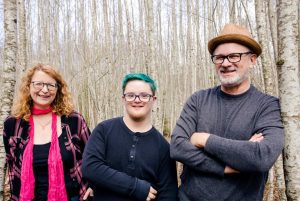“I believe that people with disabilities are a part of the human fabric, just like all other people with differences. ”
-Sue Robins


Raising A Baby With Down Syndrome
A Down syndrome baby changed Sue Robins’ life in ways that she never could have imagined. Her son, Aaron, was born with an extra chromosome.
That extra chromosome would cause her to re-think her entire value system and how she viewed the world,.
In her book, Bird’s Eye View she writes:
“My baby boy was beautiful. He was the product of a second marriage for both of us, evidence that broken people can heal. He symbolized hope and joy. He was our love child.”
But he wasn’t the child they were expecting. That extra chromosome would bring a set of challenges that no one is prepared for.
“I now know that I was the one who needed changing. I’ve only accepted my son through my own internal process of having a long look at my own misconceptions about disabled people.”
Raising her son, she encountered may roadblocks and social stigmas. Some questioned whether she had had prenatal testing, assuming that a positive test would have meant that she would terminate the pregnacy. Others couldn’t understnad why she’d gone ahead with the pregnancy, assuming that she knew she was carrying a baby with Down syndrome. The critiques were harsh and they hurt. When she tried to connect with other moms, they eventually went their own way, as their children followed a more “normal” developmental path.
“I had to create, from scratch, a new dream for my son, my family, and me.”
Meanwhile Sue was dealing with hospitals and doctors, where she learned that to get her son the care he needed, she would have to make that happen.
“Most of the job of being a mama bear is being outraged – at systems, at society, at injustices, at uncaring professionals.
Outrage is an all-consuming emotion that does a pretty good job of blocking vulnerability. Mama bears aren’t vulnerable! They are fiercely protective and get easily angered if there is a whiff that their child is threatened.”
The entire experience was very isolating. Every interaction with the medical community seemed like a monumental undertaking. Aaron’s Down syndrome forced her confront not just the biases of society and the health care system, but her own concepts of parenthood:
“Are we over-fixing our children so they can fit into the world? Is this being done in the pursuit of making our children the best they can be?
I have heard a number of young adults with disabilities say, “When my parents sent me to therapy, it gave the message to me that I was broken.”
I wonder now if it was me that was broken, not my son. What in the world did he have to be rehabilitated from?”

The Robins Family
Sue’s experiences as a Down Syndrome mom would lead her to becoming a leading health care advocate. She’s just published her second book, Ducks In a Row, about the need for a shift from the current corporate model back to a home human model that focuses on the patient and true healing.
Her books are so filled with the wisdom that comes from difficulty, self reflection and genuine care. As is this podcast:
Bump In The Road:
Sue Robins on the Upside of A Baby With Down Syndrome
Want The Rest of the Story?
Sues’ experience with the health care system would later include her own battle with breast cancer.
“I’ve had stumbles in my ordinary life—a divorce, big moves, lost jobs, and financial woes. When I’ve fallen, I’ve always slowly gotten back up. The year I got cancer I was brought to my knees, and I struggled to rise again.”
Facing one’s mortality is never easy. And cancer can bring so much pain beyond the actual diagnosis. It’s often a point where one goes through a total life reassessment. Sue says: “Don’t let my appearance fool you. For patients like me who seemingly present well, this just means that we fake it well. Inside I was having the biggest existential crisis of my life.”
Crises like cancer are made even more painful by the disruption in one’s social circles. People leave, leaving one to ask:
“Why have so many of my so-called friends and family dumped me?…
I wondered if my old life was just a carefully curated illusion.”
Sue’s journeys into an often cold health care system have created a deep seated sense of kindness and compassion in her approach to her advocacy efforts. Confronted with the monumental dysfunction of the system she has come to advocate for more change on a personal level.
There’s so much more in the second part of the podcast. Listen in by becoming a Bump II member. Use the code FREEMONTH to give it a try, for free.
Bump II subscribers can log in here to listen to the second half of the podcast.
[“498”]
Sue Robins: Thoughts on Life With Down Syndrome And More
“The things that make us uncomfortable are also the things that make us grow.”
“I now know that I was the one who needed changing. I’ve only accepted my son through my own internal process of having a long look at my own misconceptions about disabled people.”
“Don’t let my appearance fool you. For patients like me who seemingly present well, this just means that we fake it well. Inside I was having the biggest existential crisis of my life.”
“Medicine might cure (sometimes), it doesn’t always heal.”
“Maybe we’ve placed importance on all the wrong things – what if the solution to healing people is not knowledge and expertise – it is caring and love instead?
“Aaron has taught me that different is not bad; it is just different. Much of my own suffering in life comes from pining for a different life.”


Recent Comments